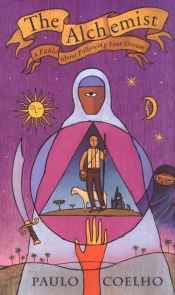a spiritual gem
With nearly two million copies sold around the world, this wonderful fable is becoming recognized for what it is—one of the truly great charmers of the late twentieth century. It’s like a surprisingly cool sea breeze coming over the desert in the evening. The innocence and charm of this fable are comparable to Jonathan Livingston Seagull, but The Alchemist is more humorous, more spiritual, and wiser. This is the story of Santiago, a wanderlust shepherd boy in Spain, who decides to act upon a dream he has one night—of discovering a buried treasure at the Pyramids of Egypt.
Santiago’s journey is not easy, but his humility, faith, and simplicity are simply unshakable. In fact, he is so naïve (in the best way possible) that it does not seem to occur to him that he could be shaken. Reading it, I was reminded of something Søren Kierkegaard wrote regarding spiritual warfare:
One thing there is which all Satan’s cunning and all the snares of temptation cannot take by surprise, and that is simplicity.
After Santiago has his dream, he is soon visited by Melchizedek, the mysterious King of Salem, who tells him that soon after someone embarks upon the path of their destiny, all the Universe conspires to help them, but only for a little while. Soon after embarking upon a trip to Africa, his money is gone and he must struggle, as almost all of us do, with precariously balancing his material needs against not losing sight of his dream and his destiny. I don’t want to give too much away, but Santiago does a much better job than most of us. He never confuses the good for the best, in spite of all temptations to fear, anger, hardships, contentment, pride in achievements, and other distractions that successfully derail most of us from pursuing our callings. Santiago’s weapons are not “determination,” but trust, not willpower, but fascination, and not strength, but wonder.
One of most poignant passages comes after Santiago leaves a comfortable oasis in Egypt, (and his new love) to attend to his dream once more. As he pauses in the desert, a horseman dressed in black rushes him, with a scimitar raised to kill. Instead of fleeing or or attempting to fight, Santiago bows his head for the blow, ready to accept even death as a gift of the adventure. His steadiness has become what St. Francis of Assisi called “perfect joy,” a joy that is totally independent of any kind of circumstance on earth, being rooted so strongly in faith.
The Alchemist is profoundly spiritual without being preachy in any way. Anyone who reads it will be impressed that this is a spiritual metaphor, an extended parable about searching for our true heart’s desire, the gold that lies buried within our own souls. It is interesting to compare this book with the more popular Celestine Prophecy. I see Coelho’s little gem as being everything the latter book should have been, but wasn’t.

